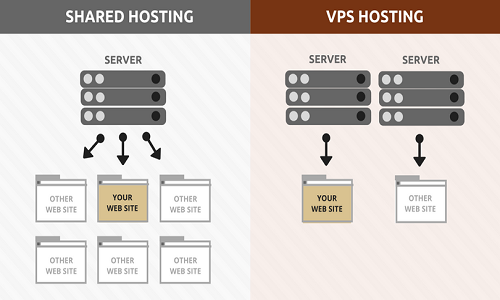Key Indicators to Shift Your Website from Shared to VPS Hosting

Websites need to be supported by optimum resources by selecting right type of web hosts as well as hosting plans. Although shared hosting can suffice hosting needs of websites during initial stages, growing resource needs may warrant upgrading of web hosting plans.
Various types of hosting
There are three major options for web hosting including shared hosting, VPS hosting, and dedicated hosting. Let us briefly understand features o these hosting plans.
Shared hosting: This is the most sought after web hosting plan for websites of new businesses or individuals and is essentially a multi-tenant offering. There can be hundreds of websites sharing resources of a single physical server in shared hosting environment. The resources of memory, disk space, network, and computing power are shared by large number of websites that have limited resource needs. Obviously, this is the most affordable type of hosting plan and therefore an ideal option for non-ecommerce websites or small business websites that are in need of an affordable hosting solution. Websites that are hosted in shared environment are governed by negligible or no security concerns and are not expecting high traffic as well.
VPS hosting: VPS stands for Virtual Private Server and is created by portioning of a large server into multiple instances of virtual servers that have individual disk space, RAM, and operating systems. This option is ideal for websites that need root access and freedom to install different applications. VPS hosting can fulfill needs of websites that are experiencing moderate to high traffic with greater security concerns. Although, VPS hosting is offered in a multi-tenant environment, users are allocated dedicated resources for greater control, flexibility, and security. It is usually referred to as an intermediate hosting between shared and dedicated server hosting.
Dedicated server hosting: If you are seeking to host your website in a single tenant environment that is designed to cater only to your site without any resource sharing, then dedicated server hosting has no alternative. Dedicated hosting allows its user website a complete autonomy of a standalone server with all its resources being reserved only for that website. It is also the costliest among all types of web hosting and is generally preferred by websites of large organizations. Dedicated hosting guarantees complete control of a single server that can be exclusively configured according to needs of the website. The server is run by its own operating system and users can choose either Linux or Windows as per requirement. If the website has to deal with extremely high traffic that is characterized by frequent fluctuations and spikes, then dedicated server hosting can be the best option. Needless to mention, dedicated server hosting is the most secured option for websites that need to handle critical or sensitive user information such as payment processing, debit or credit cards, health records, or insurance related details just to name a few.
Upgrading to VPS
Even though shared hosting is the most ideal type of hosting for small or new websites, it is not ideal for websites that are experiencing faster growth in number of concurrent visitors. It is normally chosen for newly launched websites that have smaller needs of resources.
However, if your business website has huge potential for growth in terms of visitors and needs greater security measures to carry out sensitive transactions including online payments and use of debit or credit cards, then it is time to shift to VPS hosting plan. You need to always keep in mind that hosting needs keep on changing in response to growth of your business.
In shared hosting environment, every website needs to share allocated resources and as the website continues to get bigger in terms of applications and traffic, there may be issues of downtime and slow page loading. This is the indication to plan for shifting to VPS hosting environment.
One needs to understand that in spite of being more cost effective than dedicated server hosting, VPS also offers freedom to add larger resources and flexibility of server customization. In addition, a Virtual Private Server is also able to empower a plethora of security measures to keep your website protected from hackers and intruders.
Pointers that prompt migration to VPS hosting
Slow loading website: As mentioned earlier, you website’s speed significantly relies on resource availability in response to the traffic. If your website continues to consume more resources than the allocated, then your host will notify you about the exceeded resource limit. This will also impact your website’s performance.
Need to have root access to server: There are situations that will require direct server access such as executing server configuration, installation of applications, and editing of server files among others. VPS hosting provides root access for execution of these tasks.
Enhanced security requirement: Security of hosting environment is of great significance if you are running ecommerce site or any other web application that needs visitor to enter their login credentials. VPS offers multiple layers of security to secure your online business.





